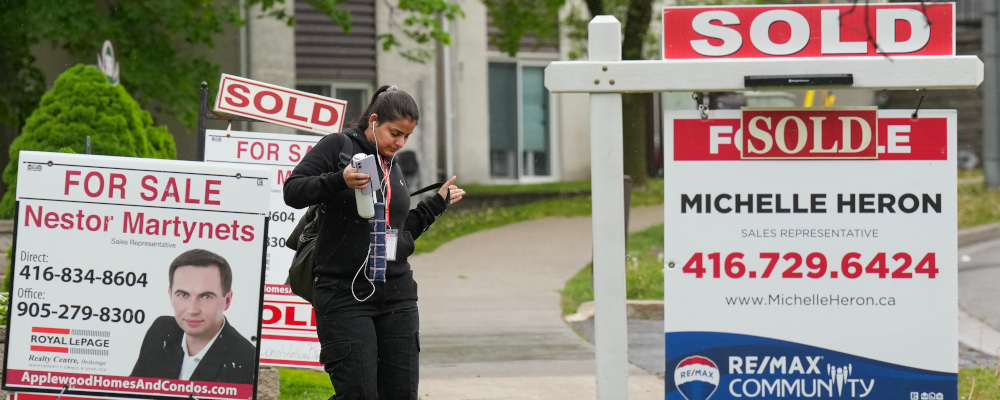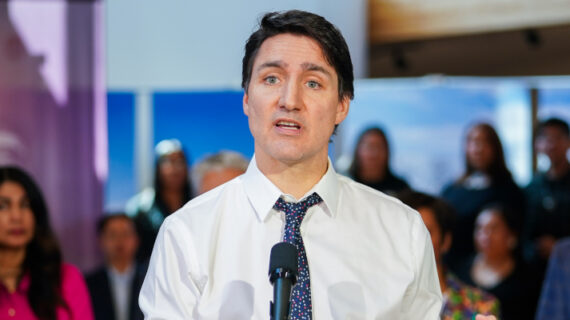- Canada’s overall debt picture remains bleak. About a quarter of Canadians can only make their minimum credit card payments, and 22 percent are sinking further into credit debt. Debt is forcing more Canadians to work past retirement age; over half of working Canadians over 60 are still working out of financial necessity.
- In May, Canada officially became the G7’s most debt-laden country, with the cost of homeownership singled out as the largest contributor, given 74.3 percent of our household debt is tied to mortgages. Easing this financial burden—or, more realistically, slowing its growth—is essential to keeping Canadians afloat.
- Overall, experts are blunt about the need for Canadians to reexamine their housing goals. "I don't think everybody gets a nice home that they like at a reasonable price. That's not coming back,” says UBC economist Thomas Davidoff.
Good news! 45 percent of Canadians are just a $200 bad break away from failing to meet their financial obligations. Oh, some context might help: that’s actually a 6 percent improvement from the last time the MNP Consumer Debt Index weighed in.
As the sentences you just read suggest, Canada’s overall debt picture remains bleak. About a quarter of Canadians can only make their minimum credit card payments, and 22 percent are sinking further into credit debt. As of Q3 2023, we owed a collective $113.4 billion on our credit cards, an eye-popping number attributed to growing interest rates and the ever-creeping cost of living.
These are not new developments. In May, Canada officially became the G7’s most debt-laden country, with the cost of homeownership singled out as the largest contributor. Ominous reports about the state of our finances appear like clockwork or, more fittingly, like monthly bills. These reports often end with worrying financial forecasts, a slurry of statistics and scenarios. But what does all this debt actually mean for Canadians?

The secret costs of debt
“Debt is the dirty little secret most people have,” says Stacy Yanchuk Oleksy, the CEO of Credit Counselling Canada. “We’ve melded your self-worth with your financial worth. And we’ve kept people uneducated about money. You feel like you’re the only one in the room, in the country, who just doesn’t know what’s going on. We would rather talk about everything else, including sex.”
Debt-laden consumers often feel embarrassed and isolated. MNP’s report touches on this, with three in five Canadians attributing their stress and anxiety to debt. And our inability to talk about money with friends or family leads people to plug “financial help” into Google and click the first link, which may not be a legitimate one.
“There’s a perception of what’s good and bad debt,” Oleksy says. “Student loans or mortgages, they’re okay. But when we get into credit card debt, high-interest loans, we don’t talk about that. You’ll ask friends about a hairdresser, but we’ll never ask for financial advice. People just keep their heads down, and it’s really stressful.”
Thanks to a patchwork of regulatory authority, free credit counselling services exist alongside for-profit operations, predatory loans, and outright scams. In November, CTV reported on a rise in unlicensed debt firms that demand upfront payment for services they cannot legally provide, as well as scammers who slip through legal loopholes and social media filters to take your money and vanish.
“It gets confusing,” Oleksy says. “We expect a consumer who’s experiencing tremendous stress to navigate this and figure out who’s for-profit, who’s accredited, what’s a scam, what’s legit. That’s hard on the best of days. Scammers run fantastic ads. I had a client who ran into a scam on Facebook and transferred $18,000 of crypto. Gone. Desperation fuels that, we’ll take the first life raft available.”
Governments have struggled to adapt to the sheer bandwidth at which modern scammers operate, but our financial omertà is especially prone to sending desperate people into their waiting arms. There is no simple solution, but Oleksy advocates for greater financial education in primary school and beyond.
“There are so many opportunities to teach people at every age about money,” Oleksy says. “You can give kids some basics about impulse control, budgeting, saving, investing. If you’re going to university, a class on financial education isn’t going to do you any harm. A lot of universities will allow credit card companies to come and advertise. You’ve got students signing up without understanding the fundamentals.”
That ignorance can continue into adulthood; how many people sign a mortgage without fully understanding it? Olesky notes there are further opportunities to educate adults, such as offering credit counselling in employee benefit packages. Those, however, are long-term ideas. In the short term, some obvious problems loom.
Debt is forcing more Canadians to work past retirement age; over half of working Canadians over 60 are still working out of financial necessity. Those who have retired aren’t necessarily doing so in comfort, as Deloitte found that 73 percent of near-retirees households would not be able to weather the financial burden of long-term medical care.
“Any dollar that goes towards debt is a dollar not paying for whatever someone wants to do in their retirement,” Olesky says. “Children can be a stressor too. A lot of adult children will move back home or ask for money. We’ve seen grandparents getting into financial difficulty trying to help their children or grandchildren out. It gets miserable and messy.”
Collectively, these problems are a potent cocktail. “I’m an eternal optimist, but I think the debt load is going to go up. Worst case scenario, insolvencies will continue to climb, and credit card debt will continue to climb. Many Canadians are absorbing shocks, but that’s not sustainable forever.”
Making housing less worse
It’s impossible to discuss debt without discussing housing; 74.3 percent of our household debt is tied to mortgages. Easing this financial burden—or, more realistically, slowing its growth—is essential to keeping Canadians afloat. To start with some good news, UBC economist Thomas Davidoff is cautiously optimistic about the homeowners of 2020 and 2021 weathering imminent refinancing.
“I think rates are starting to come down, so those people are likely to be in better shape than the class of 2019 or 2018 was,” Davidoff said. “We got through the class of 2018 okay, people reset at higher rates and there hasn’t been a flood of properties on the market. I think a scenario where people are defaulting left and right is unlikely, albeit not completely out of the question.”
Rate cuts are expected to produce a growth in home sales, despite prices still climbing. Rent, however, continues to squeeze Canadians—nationwide average rent went up 11 percent in 2023—and there are few options for short-term relief.
“It’s a tough rental market,” Davidoff says. “There isn’t a way out of the housing disaster that people who don’t currently own a home face.” Still, he notes that few of us would want to live in a world where a wave of mortgage defaults collapses the market. So what are our options? First, to state the obvious, we need to build more homes. But to avoid debt or disappointment, Canadians need to adjust their perception of what a good home is.
“More houses will really help. There are too many people for not enough homes. But lots of people will always want to be in Canada. There’s just a lot of parts of the world that aren’t in great shape. I think it’s great that Canada is so welcoming, but the downside is that it makes the housing market more competitive. We need more apartments. People are going to have to compromise in what we get in a home.”

Some gears are turning. “Provinces, and particularly the federal government, are clearly acting. They recognise they have to get more multi-family housing built. The accelerator fund has forced the provinces to deal with municipalities that won’t upzone.”
And, to be blunt, time will take its course. “The age pyramid might start to get more favourable,” Davidoff says, as boomers, predicted to sell en masse since the ‘80s, enter nursing homes. In the interim, there are some policy options. Davidoff’s work contributed to a speculation tax on non-local owners in British Columbia, and he argues that further tax restructuring could help ease the rental burden.
“Raising property taxes and cutting income and sales taxes, that helps renters at the expense of owners. Probably most of the country would benefit from a shift away from sales taxes to property taxes, which subtract from the price of homes. So that would be efficient, and it would help renters, but politically it would be very hard because people hate paying property taxes.”
Changing our expectations
Ultimately, both Olesky and Davidoff were blunt about the need for Canadians to reexamine their housing goals. “Give up on your dreams” is not pleasant advice, and communicating it is political suicide. But reality tends to prove unyielding no matter how much we object to it.
“Rates are probably going to come down and we’ll get through the rodeo without too many people getting in trouble,” Davidoff says. “Governments are really working on the policy level, but I think all the policy options on the table involve making the rate at which things get worse slower. I don’t think everybody gets a nice home that they like at a reasonable price. That’s not coming back.”
With housing out of reach for the foreseeable future, how will Canadians react? How should they react? “The economic conditions for every generation are different. It’s easy to feel ripped off,” Olesky says. “Everyone needs shelter. I rent. Do I want a forever home? Yeah, but I don’t need it. Homeownership has become this dream everyone has to achieve, where you’re a better person if you have a home. But if you go to the bank and they give you more than you can really afford, the riskier it becomes when we have economic shocks.”
It would be insipid to conclude that our debt woes and housing crisis could be solved if everyone cut back on Starbucks, but as crushing as the cost of living has become, Canadians are trying to reclaim the unique conditions of the past. If we don’t embrace caution and realism, that could lead to an ugly future.
“I think we’re starting to see people say, ‘Hey, let’s reconsider this whole immigration thing,’” Davidoff says. The rate of growth might be addressed by immigration policy, but fundamentally if we want to offer people the opportunity to come to Canada that’s going to impact the housing market. My preference is to deal with housing. But the Trumpian attitude of ‘They’re taking your house,’ it’s only a matter of time because younger people must be pissed off.”




